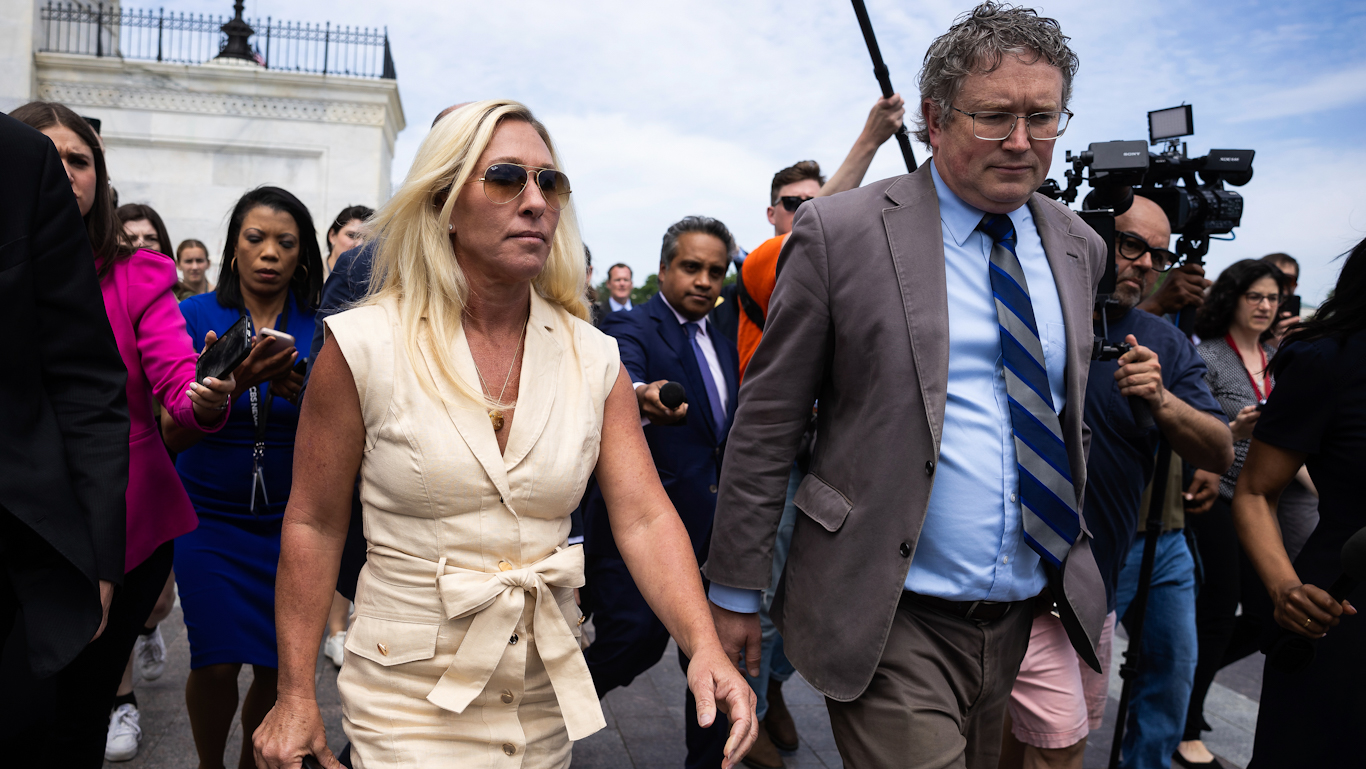A sweeping pro-Israel bill backed by Republican leadership and AIPAC collapsed this week after a rare revolt by right-wing lawmakers who argued it posed a direct threat to Americans’ First Amendment rights.
The bill, H.R. 867 — known as the IGO Anti-Boycott Act — would have imposed up to $1 million in fines and prison terms of up to 20 years on Americans who support international boycotts of Israel, even those led by the United Nations.
The bill had been scheduled for a vote Monday but was abruptly pulled from the House calendar following backlash from a broad coalition of critics, including the Council on American-Islamic Relations (CAIR) and conservative firebrands like Rep. Thomas Massie, Rep. Marjorie Taylor Greene, and Rep. Matt Gaetz.
While pro-Israel legislation typically enjoys broad bipartisan support, this rare fracture among Republicans helped stall what would have been the most extreme escalation yet of anti-BDS (Boycott, Divestment, Sanctions) laws in the United States.
CAIR issued a public call urging Congress to reject the legislation “over the threat it poses to First Amendment free speech rights.” That pressure campaign came as social media posts expressing concern about its potential impact on free speech helped mobilize conservative voters and right-wing influencers against the bill — culminating in House leadership scrapping the scheduled vote.
Rep. Marjorie Taylor Greene stated, “I will be voting NO. It is my job to defend Americans’ rights to buy or boycott whomever they choose without the government harshly fining them or imprisoning them.”
Rep. Thomas Massie wrote on X, “Apparently HR 867 has been pulled from the schedule for this week. Thank you for your vocal opposition on this platform. It was a ridiculous bill that our leadership should have never scheduled for a vote.”
Rep. Matt Gaetz added, “H.R. 867 could punish dissent or ‘thought crimes’ with prison. Antisemitism is a real problem. It deserves a response far more serious and thoughtful than this dangerous and unconstitutional Lawler virtue signal.”
The revolt sparked outrage among pro-Israel Democrats. “It’s beyond outrageous and offensive that House leadership bowed to extreme-right forces and pulled this commonsense, bipartisan bill,” said Rep. Josh Gottheimer, a co-sponsor of the legislation, in a statement to Newsweek. Gottheimer defended the bill as a necessary measure to combat what he described as “antisemitic and hate-driven boycotts.”
The legislation’s lead sponsor, Rep. Mike Lawler, received more than $634,000 in donations from pro-Israel political action committees during the 2023–2024 cycle, according to campaign finance records. Critics argue that H.R. 867 was crafted as a direct extension of earlier efforts to outlaw participation in international boycotts of Israel — a tactic often used by human rights groups and multilateral bodies.
Originally passed in 2018, the Anti-Boycott Act prohibits U.S. companies from cooperating with foreign boycotts that are not sanctioned by the United States government. The act is enforced by the Office of Antiboycott Compliance (OAC), a division of the U.S. Department of Commerce’s Bureau of Industry and Security. Until now, enforcement has largely focused on corporations.
H.R. 867 sought to extend that authority to individuals, and to boycotts initiated by international governmental organizations such as the United Nations. Under the bill, an American could face up to 20 years in prison and $1 million in fines for simply citing a UN-backed boycott as the reason for not buying Israeli goods.
Even more controversially, Section 2(b)(2) would criminalize “furnishing information about whether someone is associated with charitable or fraternal organizations that support the boycotted country,” if done to comply with or support an IGO-led boycott.
Some critics have warned that this could expose journalists, researchers, and activists to prosecution for publicly identifying ties to groups like AIPAC, Friends of the IDF, or Christians United for Israel — organizations that play significant roles in lobbying, funding, or political advocacy for Israel.
The fight over H.R. 867 is the latest in a long series of efforts to codify speech restrictions around criticism of Israel. Thirty-eight U.S. states have passed similar anti-boycott laws or executive orders, many of which have been challenged in court. The Trump administration’s 2019 executive order redefining antisemitism to include certain criticisms of Israel was further enshrined in federal law in 2024 through the Antisemitism Awareness Act, which adopted the controversial IHRA definition.
Congress also passed the Combating BDS Act in 2019, with then-Senator Marco Rubio among its chief sponsors. These measures have created a sprawling legal framework designed to penalize or discourage individuals and businesses from participating in boycotts targeting Israeli policies.
While H.R. 867 has been shelved for now, it is not dead. The bill remains alive in committee and may return in revised form. Meanwhile, grassroots organizers are pushing for continued pressure to ensure it does not resurface. CAIR has launched a petition urging Congress to reject any future version.
As public opinion shifts further away from support for Israel — a majority of Americans now oppose it — the collapse of H.R. 867 may signal growing backlash, even within pro-Israel political strongholds, about Trump-led efforts to criminalize political dissent.
Feature photo | Reps. Marjorie Taylor Greene (R-Ga.) and Thomas Massie (R-Ky.) are pursued by journalists as they depart a vote at the U.S. Capitol on April 30, 2024. Francis Chung | POLITICO via AP Images
Robert Inlakesh is a political analyst, journalist and documentary filmmaker currently based in London, UK. He has reported from and lived in the occupied Palestinian territories and hosts the show ‘Palestine Files’. Director of ‘Steal of the Century: Trump’s Palestine-Israel Catastrophe’. Follow him on Twitter @falasteen47


